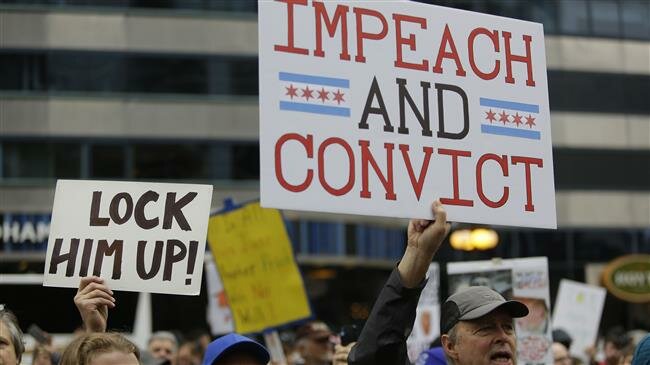US: Pressure mounts on Trump as Supreme Court rules NY prosecutors can obtain tax returns
The US Supreme Court ruled on Thursday that a New York prosecutor investigating President Donald Trump and the Trump Organization in connection with hush-money payments can obtain his financial records, including his tax returns.
The 7-2 ruling authored by Chief Justice John Roberts means that the subpoena issued to Trump’s long-time accounting firm, Mazars LLP, for various financial records to be turned over to a grand jury as part of a criminal investigation can be enforced.
The court rejected arguments by Trump’s lawyers and the Justice Department that the president is immune from investigation while he holds office or that a prosecutor must show a greater need than normal to obtain the records.
US president Trump ‘must hand over records’ to justice, ‘unlikely to become public before election’
“Two hundred years ago, a great jurist of our Court established that no citizen, not even the President, is categorically above the common duty to produce evidence when called upon in a criminal proceeding,” the court said. “We reaffirm that principle today.”
Unlike other recent presidents, Trump has refused to release his tax returns and other documents that could provide details on his wealth and the activities of his family real-estate company, the Trump Organization. The content of these records has remained a persistent mystery even as he seeks re-election.
It probably will be at least several weeks before the court issues a formal judgment that would trigger the turnover of the records.
Trump was quick to respond to the ruling, suggesting in a tweet that he was being treated unfairly: “Courts in the past have given “broad deference”. BUT NOT ME!”
A decade of tax returns
As part of a criminal investigation launched in 2018 by the office of Manhattan District Attorney Cyrus Vance, a Democrat, subpoenas were issued to Mazars for financial records including nearly a decade of Trump’s tax returns to be turned over to a grand jury in New York City.
The investigation launched into Trump and the Trump Organization was spurred by disclosures of hush-money payments to two women who said they had past sexual relationships with him, pornographic film actress Stormy Daniels and former Playboy model Karen McDougal. Trump and his aides have denied the relationships.
In the litigation over the House subpoenas, Trump argued that Congress lacked a valid purpose for seeking his records and that disclosure of the material would compromise his and his family’s privacy and distract him from his duties.
Trump’s lawyers argued in the New York case that, under the Constitution, he is immune from any criminal proceeding while serving as president. They also cited Justice Department guidance that a sitting president cannot be indicted or prosecuted.
In a lower court hearing, Trump’s lawyers went so far as to argue that law enforcement officials would not have the power to investigate Trump even if he shot someone on New York’s Fifth Avenue.
House committees denied – for now
In a separate case reviewed on Thursday, the Supreme Court sidestepped ruling on whether three investigative committees in the US House of Representatives could obtain Trump’s financial documents under subpoena, instead returning the ruling to lower courts.
Congress had been seeking records – from Mazars and two banks, Deutsche Bank and Capital One – for more than a year. The outcome is at least a short-term victory for Trump, who has strenuously sought to keep his financial records private.
The House Oversight Committee in April 2019 issued a subpoena to Mazars, seeking eight years of accounting and other financial information in response to the congressional testimony of Michael Cohen, Trump’s former lawyer. Cohen said Trump had inflated some assets and deflated others on financial statements between 2011 and 2013, in part to reduce his real estate taxes.
The House Financial Services Committee has been examining possible money laundering in US property deals involving Trump. In a separate investigation, the House Intelligence Committee is investigating whether Trump’s business dealings made him vulnerable to the influence of foreign individuals or governments.
(FRANCE 24 with REUTERS and AP)





